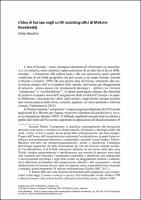Chapter L’idea di Europa negli scritti autobiografici di Maksim Kovalevskij
| dc.contributor.author | Baselica, Giulia | |
| dc.date.accessioned | 2022-09-15T20:06:31Z | |
| dc.date.available | 2022-09-15T20:06:31Z | |
| dc.date.issued | 2019 | |
| dc.identifier | ONIX_20220915_9788864539102_52 | |
| dc.identifier.issn | 2612-7679 | |
| dc.identifier.uri | https://library.oapen.org/handle/20.500.12657/58256 | |
| dc.language | Italian | |
| dc.relation.ispartofseries | Biblioteca di Studi Slavistici | |
| dc.subject.classification | thema EDItEUR::J Society and Social Sciences::JH Sociology and anthropology::JHB Sociology | en_US |
| dc.subject.other | Maksim Kovalevskij | |
| dc.subject.other | Russian Europeanism | |
| dc.subject.other | Russian sociology | |
| dc.subject.other | Europe | |
| dc.title | Chapter L’idea di Europa negli scritti autobiografici di Maksim Kovalevskij | |
| dc.type | chapter | |
| oapen.abstract.otherlanguage | In Russia, the term “Europeanism” first appeared in the 19th century. The russkij evropeec (European Russian) received a European upbringing that incorporated the moral and cultural values developed within European civilization since the 14th century and can be seen as an embodiment of the European spirit. We argue that the apogee of russkij evropeec may be represented by Maksim Maksimovič Kovalevskij (1851-1916), historian, jurist, sociologist, ethnographer, and political activist, who died on the eve of Empire’s fall. This article examines the components of the European idea as they are are found in the autobiographical writings of this outstanding intellectual. | |
| oapen.identifier.doi | 10.36253/978-88-6453-910-2.27 | |
| oapen.relation.isPublishedBy | bf65d21a-78e5-4ba2-983a-dbfa90962870 | |
| oapen.relation.isbn | 9788864539102 | |
| oapen.series.number | 43 | |
| oapen.pages | 10 | |
| oapen.place.publication | Florence |

